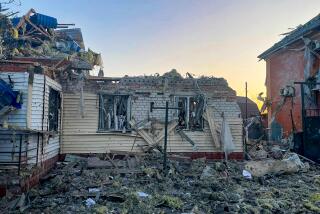Turkish push urged against Kurdish militants in Iraq
- Share via
ISTANBUL, TURKEY — The Turkish military’s powerful chief declared Thursday that his army should be given the go-ahead for a cross-border offensive into northern Iraq to pursue Kurdish rebels using the territory as a staging ground for attacks.
The United States has strongly warned Turkey against such an incursion, saying it could destabilize the entire region. Any strike across the border could leave the American military in a difficult position if this fellow member of the North Atlantic Treaty Organization ended up battling Iraqi Kurds, who are key U.S. allies.
But several Western diplomats, speaking on condition of anonymity, said they feared that in this election year, the Turkish government would succumb to popular sentiment and authorize some kind of military push.
In an unusual public assertion, Gen. Yasar Buyukanit said Kurdish rebels who take shelter in the autonomous zone controlled by Kurds in northern Iraq posed an unacceptable danger to Turkey. The army should be allowed to go after them, he said.
“There is a need for a military operation against the terrorist organization ... in the north of Iraq,” the general told journalists during a televised interview in Ankara, the capital. “Should it be done militarily? Yes, it should.... Would it be useful? Yes, it would.”
By law, parliament must give its approval to military operations outside Turkish territory. The army chief’s call puts heavy pressure on Prime Minister Recep Tayyip Erdogan to seek such authorization from lawmakers.
“A political decision is required for that,” said Buyukanit, whose military has long been a dominant force in Turkey’s political life. “The Turkish armed forces have the capacity and means -- more than required -- to launch such an operation if legally authorized.”
A full-blown Turkish military operation in northern Iraq is still considered unlikely by most analysts, but Buyukanit’s comments were the latest sign that smaller-scale activity against rebel sanctuaries is increasingly likely -- perhaps in the form of airstrikes or commando raids.
Repeated complaints
Turkey has bitterly and repeatedly complained to the Iraqi government about what Ankara says has been a failure to rein in rebels from the Kurdistan Workers Party, or PKK, who slip back and forth across the Turkish-Iraqi frontier. The U.S., together with Turkey, considers the group a terrorist organization.
“The PKK has huge freedom of movement in Iraq,” Buyukanit said. “It has sunk its roots in Iraq.”
Turkey says that nearly 4,000 Kurdish militants are believed to be based in northern Iraq, with about half that number operating mainly inside Turkey.
In recent public comments, Turkish officials have appeared to be building a case for an incursion into northern Iraq, describing potential military strikes as amounting to self-defense under international law.
The Iraqi Kurds, long repressed by Saddam Hussein’s regime, gained autonomous rule in northern Iraq after the U.S. and allied militaries imposed a no-fly zone over the region in the wake of the 1991 Persian Gulf War. The move prevented the Iraqi military from exerting control.
Tensions have been steadily increasing between the Turkish government and Iraqi Kurds over the future of Kirkuk, an oil-rich city in northern Iraq. Iraqi Kurds want it to become part of their region, a development Turkey fears would provide a source of funding for the broader Kurdish struggle.
The Iraqi government has agreed to hold a constitutionally mandated referendum on Kirkuk’s fate by year’s end, despite fierce objections from other ethnic groups, including Turkmens and Arabs.
Turkish officials responded with anger last week when Iraqi Kurdish leader Massoud Barzani suggested that Turkish interference in Iraq could trigger intervention by the Iraqi Kurds in ethnically Kurdish cities and towns in Turkey.
“There are 30 million Kurds in Turkey, and we don’t interfere there,” Barzani told Al Arabiya television in an interview Saturday.
“If they interfere in Kirkuk, ... then we will take action regarding the 30 million Kurds in Turkey.”
Turkish Foreign Minister Abdullah Gul sharply protested the remarks, asking U.S. Secretary of State Condoleezza Rice to intercede in the dispute. The Bush administration has told Turkey that it sympathizes with its fight against PKK rebels but that any incursion would be counterproductive.
Operations are intensified
With spring arriving in the rugged mountains of Turkey’s predominantly Kurdish southeast, Ankara has intensified military operations against rebels on its side of the border.
Buyukanit pointed to intelligence reports that he said indicated that the guerrillas intended to step up their fight against Turkish troops. He said the Turkish military was engaging in “large-scale” offensives against the rebels, but provided no details.
Recent clashes in Turkey have left 10 government soldiers and more than two dozen PKK militants dead, Turkish authorities say. Turkey has denied shelling PKK positions in Iraq.
The last major Turkish push into Iraq, involving tens of thousands of troops, was nearly 15 years ago. It did little to quell the Kurdish rebellion.
Turkey’s often-brutal tactics in the long battle against Kurdish separatists have been a blot on the country’s human rights record. This has been an impediment as Ankara seeks membership in the European Union.
More than 30,000 people have been killed since the conflict erupted in earnest in the mid-1980s.
More to Read
Sign up for Essential California
The most important California stories and recommendations in your inbox every morning.
You may occasionally receive promotional content from the Los Angeles Times.









